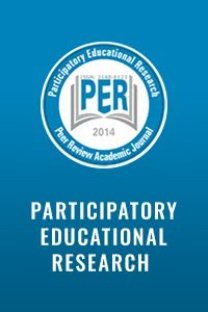The Impact of Elective Application of Science Lessons on Sciences Courses: A Qualitative Study of 6th Grade Students
___
- Akın, M. F. (2007). The effects of a constructive learning approach on learning success in the teaching of identities. (Unpublished master’s thesis). Dicle University, Graduate School of Natural and Applied Science, Diyarbakır.
- Balım A. G., Sucuoğlu H. &Aydın G., (2009). Developing Attitude Scale Journal of Education, 25, 33- 41.
- Bilgin I. (2006). The Effects of hands-on activities incorporating a cooperative learning approach on eight grade students’ science process skills and attitudes toward science. Journal of Baltic Science Education, 1 (9), 27–37. http://eds.b.ebscohost.com/eds/pdfviewer/pdfviewer?sid=14e0d31a-b907-406a-b60a-ab02b1f260ef%40sessionmgr111&vid=0&hid=112
- Bozdogan, B., Bozdogan, A. E., & Sengul, Ü. (2014). Examination of Teacher Views About “Implementation Science” Course with Regard to Different Variables. Mersin University Journal of the Faculty of Education, 10(3). 96-109. http://dergipark.ulakbim.gov.tr/mersinefd/article/view/5000033590/0
- Büyüköztürk, Ş., (2004) Sosyal Bilimler İçin Veri Analizi El Kitabı [Handbook of Data Analysis For Social Sciences]. 4. Baskı, Ankara: Pegema Yayıncilik, Cohen, L. & Manion, L. (1994). Research Methods in Education. (Fourth Edition), Newyork: Rutledge.
- Çavuş,R. & Öztuna Kaplan, A. (2013, September). Fen Bilimleri Öğretmenlerinin Ortaokul 5. Sınıf Bilim Uygulamaları Dersine Yönelik Görüşleri. 22. Ulusal Eğitim Bilimleri Kurultayı, Eskişehir Osmangazi Üniversitesi, Eskişehir.
- Çepni, S. (2009). Araştırma ve Proje Çalışmalarına Giriş [Introduction to Research And Projects Studies]. (Revised Edition). Trabzon: Celepler Matbaacılık
- Demirbaş, M., & Yağbasan, R. (2004). A research on the progress of evaluating affective characteristics in science teaching and the analysis of teachers’ practices in teaching process. Journal of Kırşehir Education Faculty 5(2), 177-193. http://kefad.ahievran.edu.tr/archieve/pdfler/Cilt5Sayi2/JKEF_5_2_2004_177_193.pdf
- Demirkuş, N. (1999). Fen Bilgisinde Öğretim Yöntemleri ve Uygulamalarının Verimli Hale Getirilmesi. Dokuz Eylül Üniversitesi Buca Eğitim Fakültesi Dergisi Özel Sayı,11, 414-425.
- Dinçer A., Şazmaz A., Keleş B., Oral I. & Sarıışık Y.,( 2013). Eğitim İzleme Raporu 2012 [Education Monitoring Report 2012]. Pres: İmak Ofset, İstanbul, Eylül.
- Duvarcı, D. (2010). Activity-based chemistry teaching: A case of “elements and compounds”. Procedia Social and Behavioral Sciences, 2, 2506–2509. doi:10.1016/j.sbspro.2010.03.362. http://www.sciencedirect.com/science/article/pii/S1877042810004027
- Eke, C.(2013). Seçmeli “bilim uygulamalari” dersinin fen bilimlerinin öğretimi açisindan önemi. Journal of Research in Education and Teaching. Sayı,2, 21. http://dergipark.ulakbim.gov.tr/mersinefd/article/view/5000033590/0
- Hançer, A. H., Şensoy. & Yıldırım, H. İ.(2003). An evalation about the importance of contemporary science education at elemantary schools and how this kind of science teaching must be, Pamukkale University Journal of Education,13,80-88. file:///C:/Users/PROBOOK/Downloads/5000056325-5000074395-1-PB%20(2).pdf
- Kaya, H. & Böyük U. (2012). Attitudes towards science and technology cours and science experiments of the elementary school’s 2nd grade students, Tübav Bilim Dergisi 4(2) 120-130. file:///C:/Users/PROBOOK/Downloads/136-341-1-PB.pdf
- Koç A. & Böyük U. (2012). The Effect of Hands-on Science Experiments on Attitude towards Science, Journal of Turkish Science Educatıon 9(4) 102-118. http://search.proquest.com/openview/598e047d1403c14fd72683363ee56b0a/1?pq-origsite=gscholar
- MEB. (2013a). İlköğretim Kurumları (İlkokullar ve Ortaokullar) Fen Bilimleri Dersi (3, 4, 5, 6, 7 ve 8. Sınıflar) Öğretim Programı [Primary Schools (Primary and Secondary Schools) Science Course (3, 4, 5, 6, 7 and 8th Grades) Curriculum]., Ankara: Ministry of National Education www.mku.edu.tr/getblogfile.php?keyid=2429.
- MEB. (2013b). Ortaokul ve İmam Hatip Ortaokulu Bilim Uygulamaları Dersi (5, 6, 7 Ve 8. Sınıflar) Öğretim Programı .[ Secondary School and Imam Hatip Middle School Science Applications Course (5, 6, 7 and 8th Grades) Curriculum]. Ankara:Ministry of National Education. http://ttkb.meb.gov.tr/dosyalar/programlar/ilkogretim/bilimuygulamalari_ort.pdf
- Tekbıyık, A. ve Akdeniz, A.R.(2008). Teachers’ Views about Adoption and Application of Primary Science and Technology Curriculum. Necatibey Faculty of Education Electronic Journal of Science and Mathematics Education, Vol. 2, Issue 2, pp. 23-37. http://dergipark.ulakbim.gov.tr/balikesirnef/article/view/5000084754/5000078836
- Telli, A., Yıldırım ,İ. H., Şensoy, Ö., & Yalçın, N. (2004). A Study on the Effect of Use of Experimental Method in Teaching the Topic of Simple Machines on 7th Grade Primary School Students’ Achievement, Gazi University Journal of Gazi Educational Faculty, 3, 291-305.
- Ural Keleş, P., Aydin, S. ve Öner. A. (2015). The Opinions Of Sixth Grade Students Regarding The Elective Science Applicatıons Class. Jokull Journual, 65(1), 100-116. URL 1 http://kumlu.meb.gov.tr/meb_iys_dosyalar/ 15/05/2014.
- Wellington, J., (2000). Educational Research, Continuum, London and New York
- Yerer, H., Bektaş, O., ve Öner Armağan, F. (2013). Bilim Uygulamaları’ ve ‘Çevre ve Bilim’ Seçmeli Derslerinin İçeriği Hakkında Fen Bilimleri Öğretmenlerinin Görüşleri, Erciyes University, Institue of Journal Social Sciences, 35(2), 72-94. http://sbedergi.erciyes.edu.tr/35.sayi/makale/5-Handan%20Yerer%20(72-94.%20s).pdf
- Yırtıcı, Z. (2014). Impact of optional courses of scientific application on students'scientific process skills and motivations towards science. (Unpublished master’s thesis). Gazi University The Graduate School of Educational Sciences, Ankara.
- ISSN: 2148-6123
- Yayın Aralığı: Yılda 6 Sayı
- Başlangıç: 2014
- Yayıncı: Özgen KORKMAZ
Pınar URAL KELEŞ, Süleyman AYDIN
Buğrahan EKİN, Şafak ULUÇINAR SAĞIR, Fatih SALTAN
Aykut Emre BOZDOĞAN, Kerem BOZDOĞAN
İjlal OCAK, Selcen Süheyla ERGÜN
Özlem ÖZÇAKIR SÜMEN, Hamza ÇALIŞIR
Nida BAYINDIR, Levent SEVİ, Aynur ÇUKURCALIOĞLU
Pınar URAL KELEŞ, Mehmet Akif HAŞILOĞLU, Süleyman AYDIN, Ayşegül ÖNER
